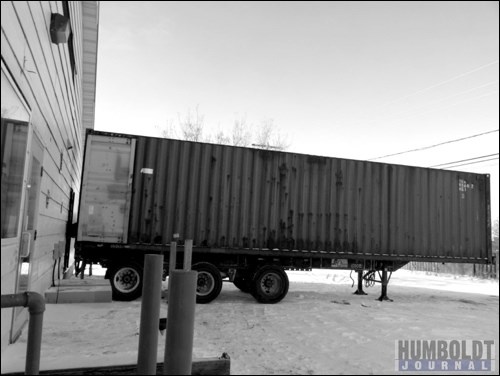After three years of hard work and quite a bit of hassle, the container filled with supplies donated by Humboldt finally reached its destination in Ussongo, Tanzania in July.
"It had a long wait sitting in the docks," said Norm Duerr, head of the committee that spearheaded the project. "There were constant emails and telephone calls, fears were raised. One time there was fear that it had been stolen."
According to Duerr, the supply container left Humboldt on Nov. 11, 2011 by truck and was taken to a railway station in Regina. From there it went via rail all the way to Montreal, where it was loaded onto a ship on Dec. 6, 2011. It took around four months to travel to Africa, where it landed at the port of Dar Es Salaam in March of 2012.
"It had a long wait in Dar Es Salaam because of a switch from government to private ownership," said Duerr. "At one point there were even threats that the container would be breached."
After more than a year of communication, during which additional funds and a new manifest had to be procured, the container reached its destination in Ussongo this past July.
"I always kept hope alive and I was assured by SaskTel that it would get there eventually," said Duerr, "but I almost began to lose hope towards the end, wondering if it would ever get there."
The idea for this project began during one of Duerr's visits to Ussongo. He had been visiting the small village for a few weeks every year since 2007. He would help instruct and visit with the children at St. Thomas Aquinas Secondary School, a boarding school near the village.
"The general manager of the school was trying to get science labs built, so he came to me and asked if I could get some lab equipment," said Duerr.
Duerr went home to Humboldt and was able to procure lab equipment donations from St. Peter's College, but still needed a way to ship it. Through an old student, Duerr found out about SaskTel's corporate social responsibility program, We See You. SaskTel's partner in Tanzania is Green Hope International.
"After a few months of negotiation, I finally convinced the program director to come down with two other girls who work with We See You," said Duerr. "I also convinced local leaders, board representatives, and high school kids to come and then sold them the idea that (Ussongo) was a good community."
Duerr and his colleague, Arlene Julé, set up a committee consisting of six other members: Dean Hergott, Brand and Wanda Lefebvre, Richard and Sandra Kosokowsky and Dean Possberg. With additional support, the committee was able to set up a collection depot. From that point, it was only a matter of collecting the donations.
"We put word out to the community that a container was going to be shipped," said Julé. "We gave everyone a list of items that were needed. Soon enough, people were calling to offer items that weren't even on the list."
Duerr and the committee received support and donations from Mayor Malcolm Eaton, the Humboldt Journal, 107.5 Bolt FM radio station, and other media outlets. There were also members of the business community, local schools and churches, PotashCorp in Lanigan, and private individuals who made donations.
"We had some old, used equipment donated to us," said Duerr. "A local couple bought a generator and donated it. A new welder was also given to us, hospital beds were donated by the Ursuline nuns All of the stuff together would have been worth about $70,000 if it were new."
Various contributions included, bicycles, clothing, garden tools, night tables, two piano organs, and desks.
"Mark Doepker repaired a lot of the bicycles that were donated and needed minor repairs. That's just one of the examples of the how some of the business members showed their support."
Julé and Duerr met in 2008, during which time he convinced her to refocus her volunteer efforts on Tanzania. Julé agreed and they began going together on their volunteer trips at least once a year. Sometimes one of them would go alone.
"There's a small health clinic with African nuns, that's Arlene's focus while mine is the school," said Duerr.
Duerr originally began his volunteer efforts in Ghana in 2002 when another colleague convinced him to go. After his hip replacement surgery in November 2006, he switched to Ussongo and has continued his efforts there ever since.
"It was only a few months after my surgery. My friends and family said I shouldn't go and I said 'just watch me,'" said Duerr. "There's an old cliché, 'Africa gets into your blood,' but maybe it's already in our blood, something in our genes calling us back."




